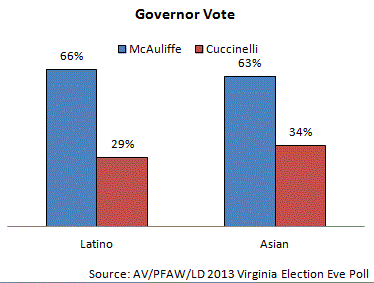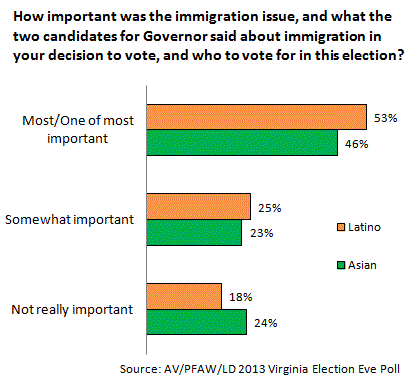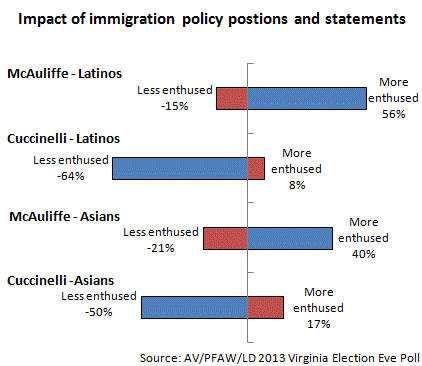Virginia’s election results were a deep disappointment for Republicans who have long been competitive—even dominant—in this Southern state. Terry McAuliffe defeated Ken Cuccinelli 48%-45%, and the margin was greater in the Lt. Governor’s race. A closely contested Attorney General’s race is too close to call.
As we reported last night, Latino Decisions 2013 Election Eve poll in Virginia (complete slide deck, topline results and full cross tabs), provided stark evidence of the demographic train-wreck that has beset the GOP in its current incarnation. While the exit polls suggest that Cuccinelli carried whites by a sizable 56%-36% margin (and 58%-33% among white men!), the story of the election is, as it was in 2012, a demographic one.

Latino Decisions estimates that Democrat Terry McAuliffe outpaced his GOP opponent, Attorney General Ken Cuccinelli, by 37 percentage points among Latinos and 29 percentage points among Asian Americans, receiving 66% of Latino vote and 63% of Asian American vote. Added to the exit poll estimates of African American vote (90%-8% favoring McAuliffe), it is abundantly clear that the GOP has a demographic problem of immense proportions.

In our posts yesterday, we laid bare how important immigration was to Latino and Asian American voters and illustrated, with a split-sample design, how much anti-immigrant rhetoric and policies mobilized support for McAuliffe.

Immigration mattered—a great deal—to Latino and Asian voters making choices and they were very put off by the policies and language used by the Attorney General. Moreover, it is worth noting that over 90,000 black immigrant naturalized citizens live in the Commonwealth, suggesting that other key voting blocs might have found immigration a critical issue.
Looking at the exit polls with respect to white non-Hispanic voters, it is easy to see how critical white voters have become to GOP candidates incapable of reaching into other populations. White voters, estimated at 72% of the electorate, gave 56% of their ballots to the GOP nominees. White voters, then, were responsible for 40.3% of Cuccinelli’s 45.5% of the vote…or 89% of all his votes won. As the white electorate grows smaller as a share of the total, the necessary margin among whites will have to grow substantially for the GOP to stay competitive in Virginia.
Can that happen? Perhaps, but we think it is unlikely with candidates like Ken Cuccinelli. Cuccinelli underperformed previous GOP nominee Gov. Bob McDonnell by 11 percentage points. Four of those went to McAuliffe and the rest, presumably, to the Libertarian Rob Sarvis. For those willing to embrace a whites-only approach, this may give them false hope that a different candidate could have won on the strength of white vote alone so in four years things will be different. But that is wrong on two fronts. First, we would be foolish to assume that the white share of the electorate will be the same in the next election or the one after that. In this election, whites were 72% of the total turned out electorate, down 7% from the 79% they were four years ago. What share of the electorate will whites be in 2017?
Second, and perhaps more importantly, Cuccinelli does not appear to be a radical departure from much of his party’s base. Among GOP identifiers, he held on to 92% of the voters. It was among independents—where exit polls show him under-performing McDonnell by 19 percentage points—where white voters really abandoned the GOP nominee. We should not assume that the only voters put off by this particular brand of conservatism are voters of color. In political science research examining the political effects of anti-immigrant politics in California, the partisan effects were visible not only among minority voters but also among moderate whites. There is every reason to expect that among moderate independents in the Northern Virginia DC suburbs, disproportionately educated voters, the same effect will occur, and the votes last night are consistent with this.
The demography is relentless and immigration remains a loser for GOP candidates in diverse electorates.
See more on the 2013 Virginia Election Eve Poll: slide deck, topline results and full cross tabs.
Gary Segura is co-founder and principal of Latino Decisions. He is a Professor of American Politics at Stanford University, where he is also Chair of Chicana/o Studies, Center for Comparative Studies in Race and Ethnicity.


